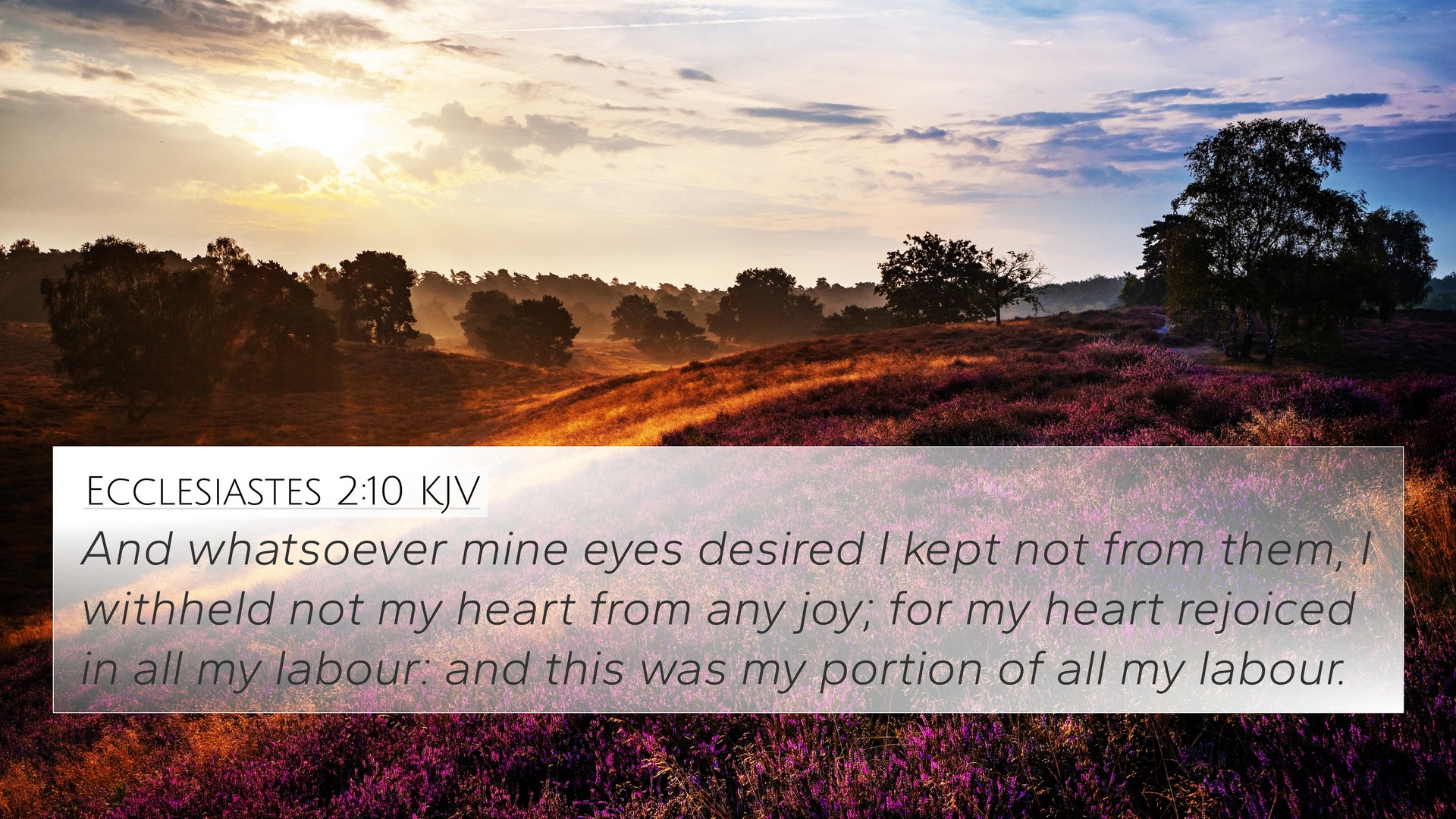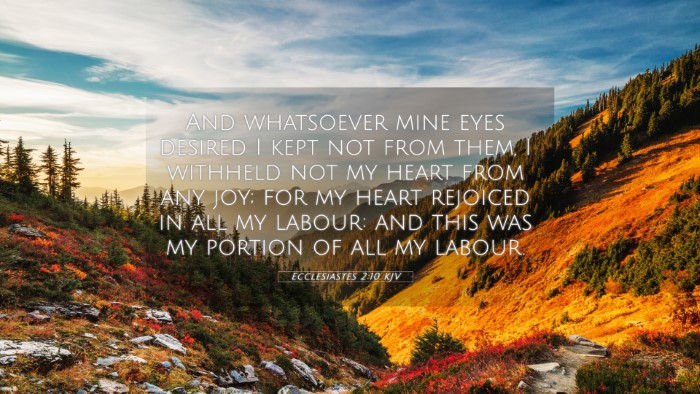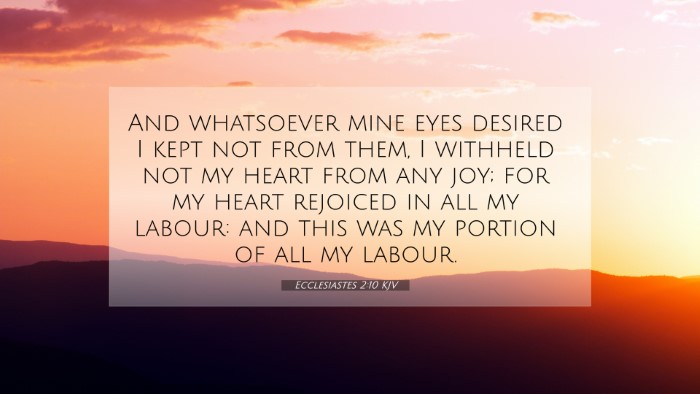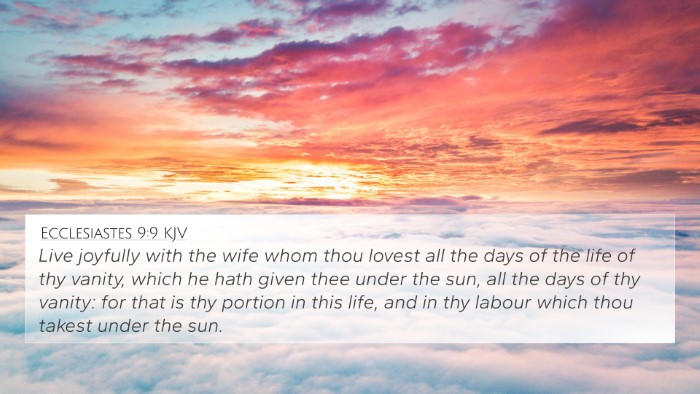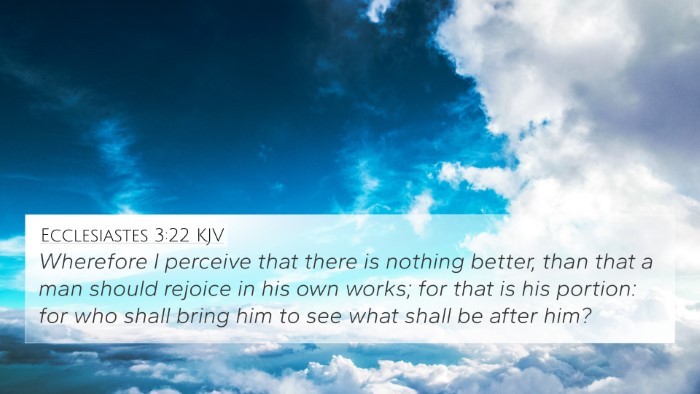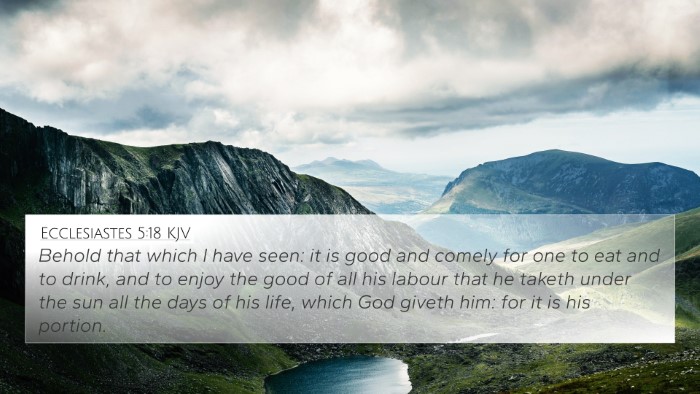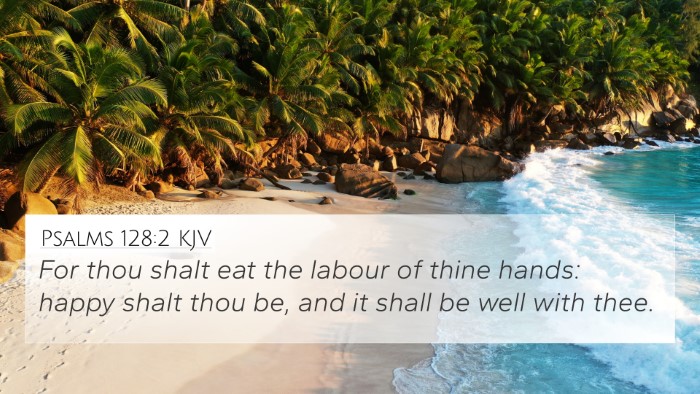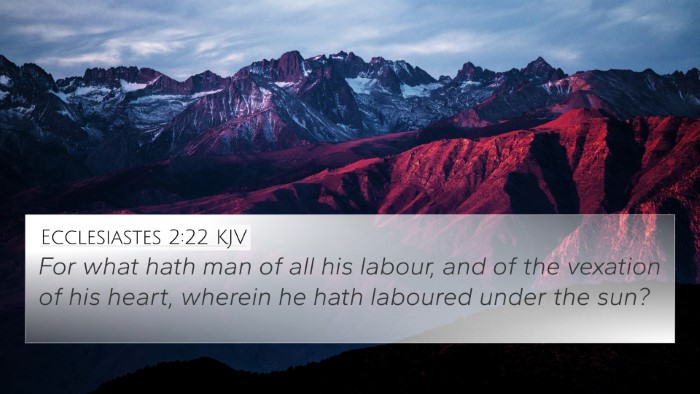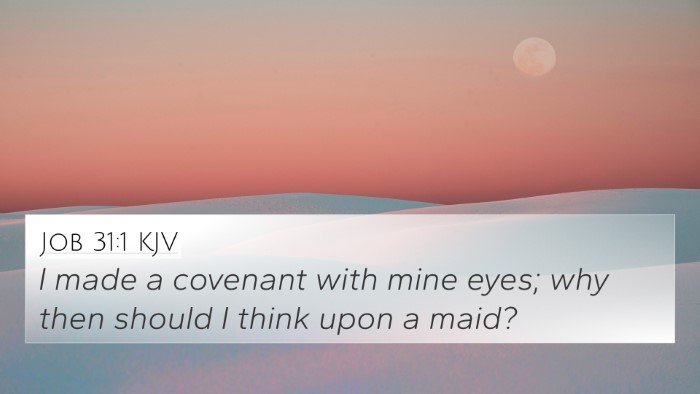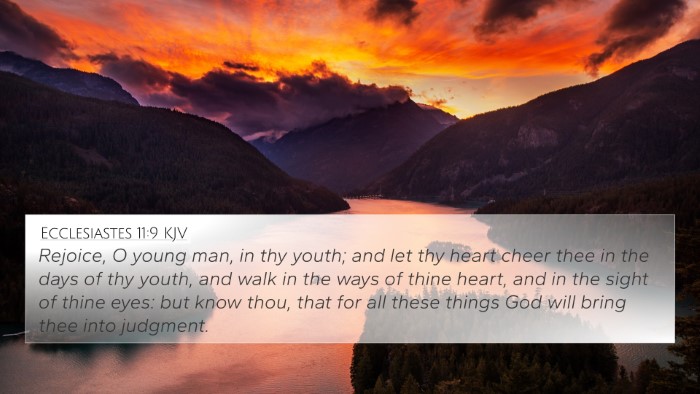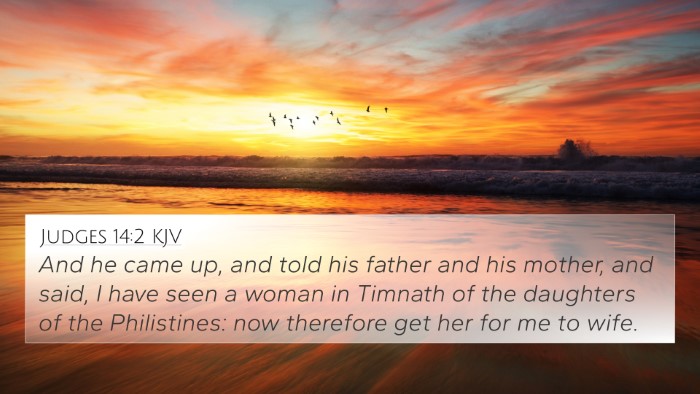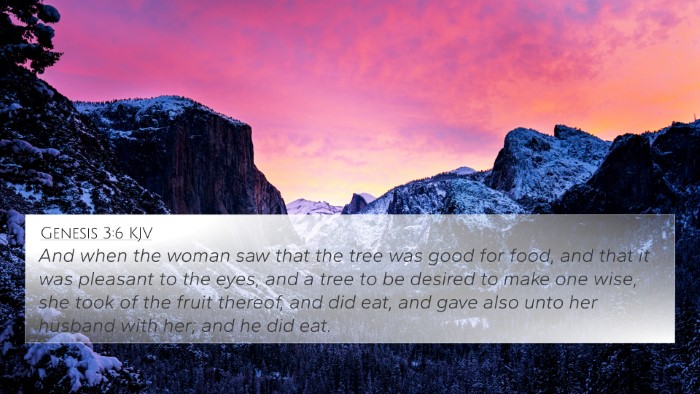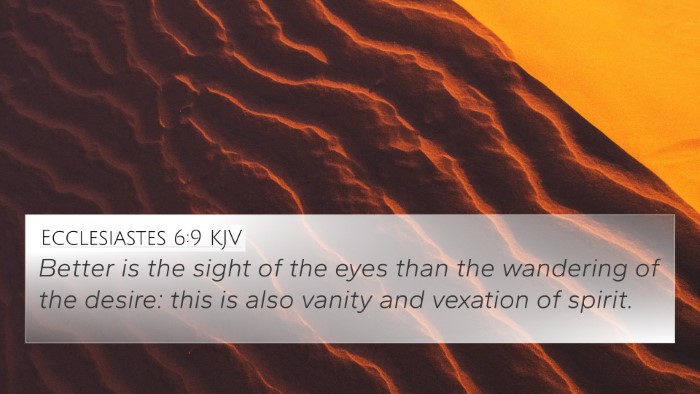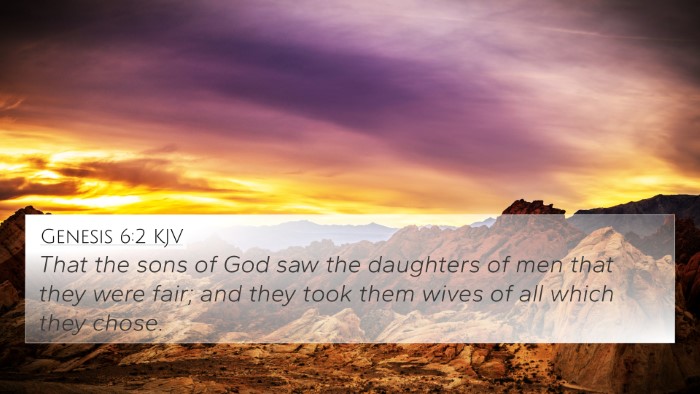Understanding Ecclesiastes 2:10
Ecclesiastes 2:10 states, "And whatever my eyes desired I did not keep from them. I withheld not my heart from any joy; for my heart rejoiced in all my labor: and this was my portion of all my labor." This verse encapsulates the reflections of the Preacher (or Qoheleth) within the book of Ecclesiastes regarding the pursuit of joy and fulfillment in life through earthly pleasures and labor.
Verse Context
In the broader narrative of Ecclesiastes, the author explores the meaning of life and the futility of earthly pursuits. This verse highlights a moment of self-reflection where the Preacher indulges in all his desires and assesses the outcome of his experiences.
Commentary Insights
1. Matthew Henry's Commentary:
- Delight and Desire: Henry points out that the Preacher allowed himself to pursue every satisfaction, demonstrating a relentless quest for joy in worldly endeavors.
- Reflection on Labor: The joy derived from one’s labor is emphasized, suggesting that fulfillment comes not just from the results, but also from the enjoyment of the process.
2. Albert Barnes' Notes:
- Human Experience: Barnes emphasizes that the Preacher’s search for joy and satisfaction mirrors common human experiences, reflecting both the pursuit and the eventual realization of their transient nature.
- Joy in Labor: He notes that the acknowledgment of joy as a 'portion' signifies the understanding that true satisfaction is both a reward and a part of one's labor.
3. Adam Clarke's Commentary:
- Absence of Restraint: Clarke discusses how the Preacher’s lack of restraint in fulfilling his desires leads to a temporary happiness but ultimately unveils the vanity of such pursuits.
- Ultimate Conclusion: Clarke points out that despite the indulgence in joys, the conclusion drawn later in Ecclesiastes reminds readers of the need for a higher purpose beyond earthly pleasures.
Bible Cross-References
This verse can be cross-referenced with several other biblical texts that explore similar themes of human desire, joy in labor, and the transient nature of life:
- Proverbs 10:22: "The blessing of the Lord, it makes rich, and he adds no sorrow with it." - Reflecting on true joy given by God.
- Ecclesiastes 3:13: "And also that every man should eat and drink, and enjoy the good of all his labor—it is the gift of God." - Affirming the divine gift of enjoyment in labor.
- Ecclesiastes 5:10: "He who loves silver will not be satisfied with silver; nor he who loves abundance, with increase. This also is vanity." - Highlighting the futility of seeking satisfaction in earthly wealth.
- 1 Timothy 6:17: "Charge them that are rich in this world, that they be not high-minded, nor trust in uncertain riches, but in the living God." - A parallel warning against misplaced trust in material pursuits.
- Philippians 4:11-12: "Not that I speak in respect of want: for I have learned, in whatsoever state I am, therewith to be content." - Teaching on contentment contrasting with human desires.
- James 4:1-3: "From whence come wars and fightings among you? Come they not hence, even of your lusts that war in your members?" - Discussing the consequences of unchecked desires.
- Hebrews 11:25: "Choosing rather to suffer affliction with the people of God than to enjoy the pleasures of sin for a season." - Addressing the temporary nature of pleasures.
Thematic Connections
The themes in Ecclesiastes 2:10 resonate throughout the Bible, weaving a narrative that discusses the human condition and the quest for meaning. Below are some thematic connections among various scriptures:
- Joy and Fulfillment: The underlying quest for joy is echoed in texts such as Psalm 16:11, "You will show me the path of life; in Your presence is fullness of joy." This underscores the notion of fulfillment in divine connection rather than solely in earthly gains.
- Labor and Results: Colossians 3:23 reinforces the idea that whatever we do should be heartily as unto the Lord, suggesting that true satisfaction comes from purpose-driven work.
- Transience of Earthly Pleasures: 2 Corinthians 4:17 enunciates the temporary nature of suffering and pleasures, drawing a contrast with eternal glory.
Conclusion
Ecclesiastes 2:10 serves as a profound reminder of the balance between enjoying life’s pleasures and recognizing their temporal nature. As underscored by various commentaries, it calls for a deeper understanding of joy not merely in material achievements but in the enjoyment of life as a divine gift.
Further Study Tools
For those looking to delve deeper into the study of cross-referencing Biblical texts, consider utilizing the following tools:
- Bible Concordance: A useful resource for locating specific words and phrases throughout the scriptures.
- Bible Cross-Reference Guide: Provides connections between verses that may not be immediately evident.
- Cross-Reference Bible Study: Methods for utilizing interconnected verses in personal or group study.
